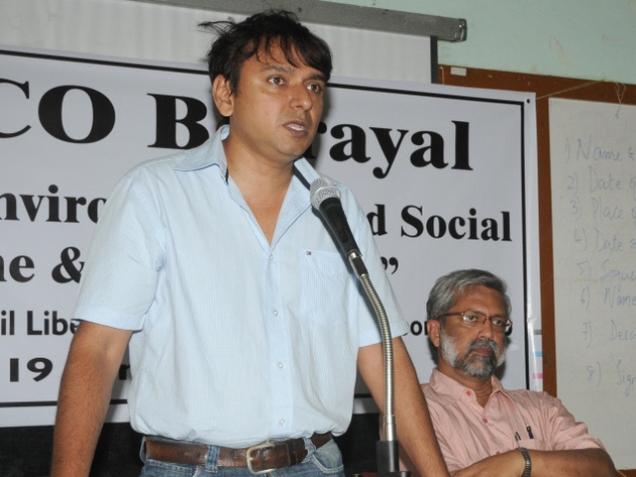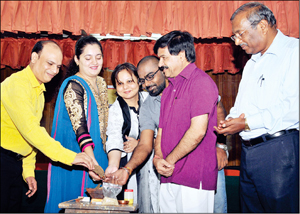
Says Hon. Wildlife Warden N.M. Naveen Kumar
One should not work in the forest just for the sake of working but should have the passion for wildlife, its protection and conservation. One such person, who not only has the passion for wildlife but also wants to create awareness among the young generation about the importance of forests and wildlife, is N.M. Naveen Kumar, Hon. Wildlife Warden of Chamarajanagar district, who holds a M.Sc degree in Public Policy and Management from University of London. He has been appointed by the State Government for the second term. Chamarajanagar District Wildlife Division consists of six ranges in Bandipur National Park, complete BRT Tiger Reserve, M.M. Hills Wildlife Sanctuary and a major portion of Cauvery Wildlife Sanctuary.
In a tete-a-tete with Star of Mysore, Naveen Kumar spoke about Wildlife Wardens, their duties, responsibilities and challenges. Excerpts…
by S. Kenneth Shishir
Star of Mysore (SOM): Who is an Honorary Wildlife Warden?
Naveen: An Hon. Wildlife Warden is a gazetted public servant, appointed under Section 4, Sub Section BB of the Wildlife Protection Act 1972. It is a statutory post that is created by an Act of Parliament.
SOM: What are the duties and responsibilities of Hon. Wildlife Warden?
Naveen: The notification issued by the Ministry of Environment and Forests has clearly stipulated the duties and responsibilities of the Hon. Wildlife Warden. The primary duties according to the Act are of enforcement in nature, namely, Control of poaching and clandestine trade in wild animals and products; Detection and prosecution of offences under the aforementioned Act; Preventing damage to the habitat of wildlife; Initiating measures for dealing with man-animal conflicts including the assessment and payment of compensation, etc.; Carrying the message of conservation to the people and enlisting public support for nature and wildlife conservation.
SOM: What powers do you have to carry out these duties?
Naveen: Hon. Wildlife Warden has the status of a deemed public servant under Section 59 of the Wildlife Protection Act 1972 and has powers of entry, search, seizure and detention under Section 50 for prevention and detection of offences under the aforementioned Act and also has powers to inspect records of licences under Section 47 Sub Section B of the Wildlife Protection Act 1972.
SOM: Do Forest officials extend co-operation to Hon. Wildlife Wardens in carrying out works?
Naveen: Co-operation is being extended to a limited extent only by a few honest officers who have the passion for wildlife conservation.
The officers whose priorities (unfortunately in majority) have certain personal agendas and they see the Hon. Wildlife Warden, especially an educated, informed and pro-active ones, as a thorn in their flesh.
SOM: Could you elaborate?
Naveen: The problem with the functional process of the Forest Department is that it is completely beyond public scrutiny unlike the works of Revenue, PWD or Police Department. For example, the Forest Department’s functioning is beyond the sight of the common man (Public) because forest is a technical subject and most importantly, the general public has no right of entry. This has created an atmosphere where “Power – Transparency = Corruption.”
Therefore, the role of Hon. Wildlife Warden becomes very crucial as he/she is the only representative of the public who has powers of entry and access into the forest.
SOM: How is the Anti-Poaching Force working in Bandipur?
Naveen: We have increased the number of Anti-Poaching Camps and to a large extent, they have been instrumental in preventing and contain poaching. But on the ground in case of Bandipur, more than 60% of the Anti-Poaching Camps do not have a gun despite several written observations in this regard.
SOM: How do they work without weapons then?
Naveen: Patrolling on foot with a machete in their hands and any observations of human intervention, animal deaths, etc. are being reported to the head quarters in the evenings. Moreover, Anti-Poaching Camps are under-staffed and in case of Bandipur, there are 68 vacant positions with 28 persons at the guard level being transferred with a replacement of only 10 guards which has left Bandipur National Park to the mercy of poachers and timber smugglers.
SOM: What are your suggestions to improve forests?
Naveen: In order to protect, conserve and improve the forests, there has to be transparency and open public scrutiny of the Department’s functioning; Corrupt officers, especially those trapped by Lokayukta and against whom cases are pending, should not be given sensitive postings in places like Nagarahole and Bandipur National Parks; The subordinate staff vacancies should be filled on priority; Weapons should be issued and hardness allowance extended to those working in the Wildlife Divisions. They should also get basic incentives like Life Insurance, canteen benefits on the lines of Police Department.
SOM: What are the challenges faced in the forest?
Naveen: Some of the major challenges being faced in the forest include sand lifting from core area sometimes with the connivance of officials concerned, timber smuggling which is being routed to depots and small game poaching especially deer, variety of fowls, hares and so on.
SOM: Has the night traffic ban been effective?
Naveen: Of course yes. Night traffic ban has been effective in ensuing peace and tranquillity for wild animals and has averted a lot of road kills. It is an outstanding example of what a passionate officer (in this case Dr. R. Raju, IFS) can contribute to the wildlife if he really minds.
SOM: What measures have been taken to end or control man-animal conflicts in forest borders?
Naveen: The Congress-led State Government has taken up a major project which is worth Rs. 230 crore. The Railway Barricade Project for border areas of both Bandipur and Nagarahole National Parks is the first in the country which is an initiative of C. Srinivasan, retd. APCCF, Project Tiger. Upon completion of this project, man-animal conflicts, especially man-elephant conflicts, would drastically subside.
Apart from this, night patrolling along sensitive areas and Village Watch Committees has been functioning to control Man-Animal conflicts.
SOM: What is your message to the younger generation who are interested in nature and wildlife conservation?
Naveen: Just remember, wildlife conservation is all about ‘swimming against the tide.’ Never hesitate to voice your opinion against the system when it is not in the interest of conservation. Help in protecting, preserving and conserving forest and wildlife by creating awareness about its importance to mankind. Those interested in wildlife conservation or have suggestions pertaining to wildlife and forest conservation may contact Naveen Kumar on e-mail: nmnaveen@yahoo.com
source: http://www.starofmysore.com / Star of Mysore / Home> Feature Articles / Wednesday – September 30th, 2015





